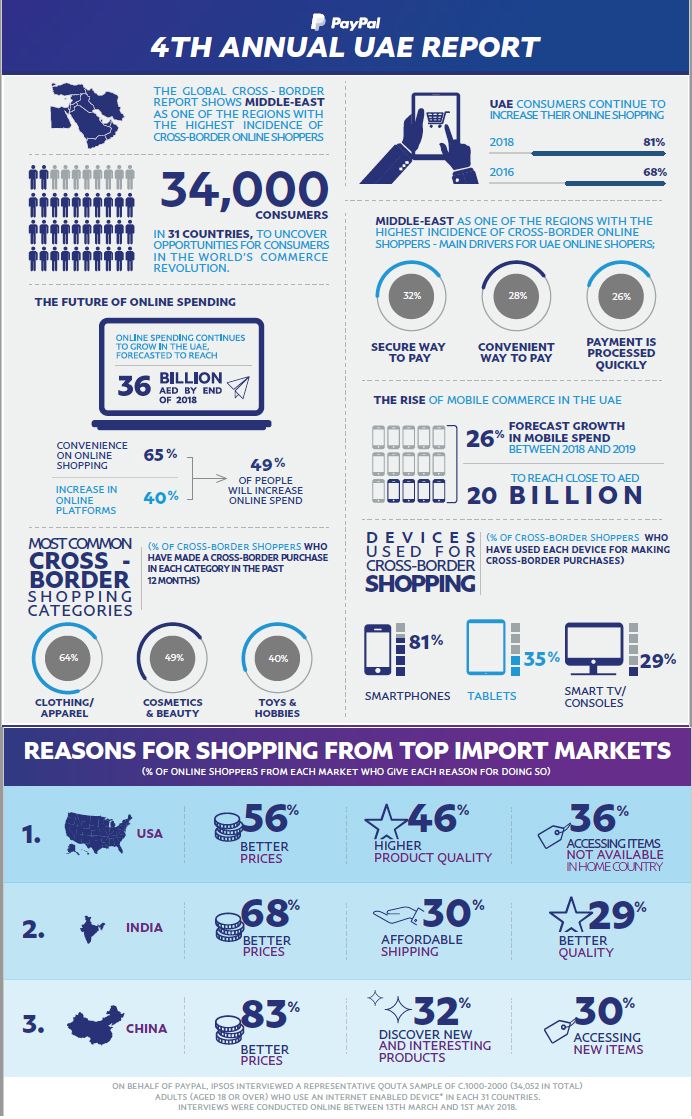Highlights
- As much as $1.5 billion is spent by UAE shoppers at online portals outside of the UAE.
- It comes down to price: Buying from an overseas site would still be cheaper by 20-30 per cent depending on the category.
Dubai: Want to buy that dress or accessory trending on all the fashion and celebrity portals right now? Or have the latest iPhone before everyone else does in this town?
Whatever be the choice, shoppers in the UAE placing orders with overseas shopping sites represent a big chunk of the overall online market. That’s despite the presence of Amazon and Noon, and all the other portals offering their products and services.
As much as $1.5 billion is spent by UAE shoppers at online portals outside of the UAE. And it can only get bigger.
“It comes down to price: Buying from an overseas site would still be cheaper by 20-30 per cent depending on the category,” said Sandeep Ganediwalla, Managing Partner at RedSeer, a consultancy. “It is so even with higher shipping charges.
“Then there’s the availability factor: It would be weeks before the latest fashion collections or trending accessories get listed on local online portals or arrive at the physical stores. There’s a big consumer base in the UAE/Gulf that will not wait that long.
“That’s why a Net-a-Porter could score with demanding fashion shoppers two-day deliveries even three or four years ago.”
Pickup and deliver
Where online shoppers go, the delivery guys will follow.
Emirates on Tuesday announced its “Emirates Delivers” services that allows shoppers in Dubai to place orders with US shopping sites and then have them delivered to their homes.
And Emirates is taking care of the entire delivery process, even managing the “last-mile”, which end with handing over of the package to the shopper.
These deliveries will be done in three to five days from the order placement.
Emirates is not alone in targeting these shoppers. Aramex has had its “Shop & Ship” service running for some time now, and then there is Post Plus’ My Box, and another service offered by MyUS Shopping.
They follow more or less the same script — the orders will be delivered to a US address maintained by the shipper.
For the Emirates Delivers service, these packages can be kept at the address for up to 30 days free-of-charge.
Then they get shipped over from the US to the UAE via Emirates’ flights. Emirates has confirmed that the delivery possibilities will be extended to beyond Dubai in subsequent rollouts, including in Europe.
The prize — a prominent spot in the $6 trillion industry that is global e-commerce. Not just online marketplaces and shopping portals, even delivery services have a role to fulfil in this cycle.
Money to be made
Why is there such interest to capture the delivery side of the UAE online shopping business? Let’s look at some numbers: shoppers in the UAE spend about $3.5 billion to $4 billion a year in picking up goods online.
Of that, about 25-30 per cent are orders placed with shopping sites outside of the UAE, with the US being the preferred choice by quite some distance. In other words — or numbers — that’s $1 billion to $1.5 billion worth of buying.
Two to three years ago, orders placed with overseas sites used to be well over the 50 per cent mark.
“Logistics companies are responding to demand from the market,” said Soumia Benturquia, CEO of Fodel, a Dubai company that specialises in last-mile delivery.
“A significant share of all ecommerce transactions in the region are actually shipped in from outside, mostly the US and China.
“Customers shop at those portals because they find a wider variety… as well as items that are still not distributed in the GCC.
“The second element involves pricing. As ecommerce volumes are high in the US and China, sellers in those markets are able to offer lower prices to consumers in our region.”
Local shoppers, global spending
In shopping, there is one constant — shoppers will go where they see the value. Or in the case of high fashion, where they can get their needs met instantly.
A study commissioned by PayPal, the online payments service provider, in August last year found 61 per cent of online shoppers in the UAE had shopped from websites in other countries in the previous 12 months.

“In today’s global society, consumer spending behaviour is increasingly being dictated by convenience and value,” Efi Dahan, General Manager for Eastern Europe, Middle East and Africa at PayPal, in a statement at the time.
“Our findings showcase this, with just over half of the online shoppers surveyed stating that it was not important to them if the retailer was based overseas.”
Even bigger than marketplaces
Ganediwalla at RedSeer makes an interesting observation about this shopper preference.
“It was believed that Aramex’s Shop & Ship service was even bigger than Souq.com at one point in time. And Aramex was only the delivery provider and not an aggregator of goods.
“Whether true or not, that’s the kind of buying capacity UAE shoppers bring. It’s also why there’s such keen interest among delivery companies for a share of the money. It’s Big Business.”
Amazon fights back
Local online websites — even those owned by global powerhouses — are doing whatever they can to reclaim the dollars being spent at sites elsewhere.
Well before Amazon changed souq.com’s name to amazon.ae, it was offering “global” access to shoppers here. This was done through “Amazon Global Store” access, where a shopper can purchase from an Amazon-operated website in another country.
This way, a UAE shopper’s search need not be limited to the merchandise listed on amazon.ae. (On deliveries, an Amazon Prime member can get deliveries from Amazon US within 6-9 business days on orders of Dh100 and more.)
Noon, the Middle East’s homegrown digital marketplace, is proud to announce the launch of two entities in China, one on the mainland and the other in Hong Kong, kick-starting noon’s Asia operations.
Find the full article here.



